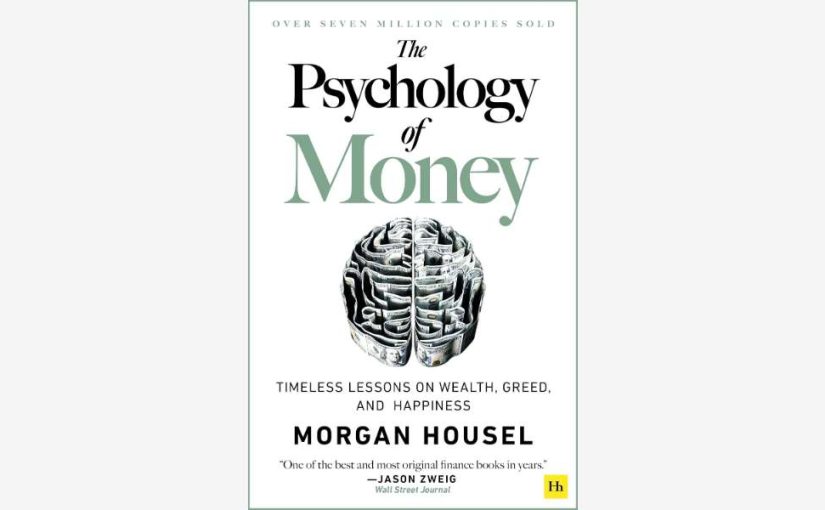Hello and Welcome. This page is a collection of 31 quotes that I liked and saved while reading The Psychology of Money book by Morgan Housel. I hope you will like them too.
By the way, I am Deepak Kundu, an avid book reader, quotes collector and blogger.
The Psychology of Money Quotes
- Many bets fail not because they were wrong, but because they were mostly right in a situation that required things to be exactly right. Room for error – often called margin of safety – is one of the most underappreciated forces in finance. It comes in many forms: A frugal budget, flexible thinking, and a loose timeline – anything that lets you live happily with a range of outcomes.
- The trick when dealing with failure is arranging your financial life in a way that a bad investment here and a missed financial goal there won’t wipe you out so you can keep playing until the odds fall in your favor.
- Everything worth pursuing has less than 100% odds of succeeding, and risk is just what happens when you end up on the unfortunate side of that equation.
- Realize that not all success is due to hard work, and not all poverty is due to laziness. Keep this in mind when judging people, including yourself.
- Financial success is not a hard science. It’s a soft skill, where how you behave is more important than what you know.
- Doing well with money has a little to do with how smart you are and a lot to do with how you behave. And behavior is hard to teach, even to really smart people.
- The difficulty in identifying what is luck, what is skill, and what is risk is one of the biggest problems we face when trying to learn about the best way to manage money.
- Compounding doesn’t rely on earning big returns. Merely good returns sustained uninterrupted for the longest period of time – especially in times of chaos and havoc – will always win.
- Money’s greatest intrinsic value – and this can’t be overstated – is its ability to give you control over your time. To obtain, bit by bit, a level of independence and autonomy that comes from unspent assets that give you greater control over what you can do and when you can do it.
- When most people say they want to be a millionaire, what they might actually mean is “I’d like to spend a million dollars.” And that is literally the opposite of being a millionaire.
- Wealth is hidden. It’s income not spent. Wealth is an option not yet taken to buy something later. Its value lies in offering you options, flexibility, and growth to one day purchase more stuff than you could right now.
- Do not aim to be coldly rational when making financial decisions. Aim to just be pretty reasonable. Reasonable is more realistic and you have a better chance of sticking with it for the long run, which is what matters most when managing money.
- Reputation is invaluable. Freedom and independence are invaluable. Family and friends are invaluable. Being loved by those who you want to love you is invaluable. Happiness is invaluable. And your best shot at keeping these things is knowing when it’s time to stop taking risks that might harm them. Knowing when you have enough.
- Most financial advice is about today. What should you do right now, and what stocks look like good buys today? But most of the time today is not that important. Over the course of your lifetime as an investor the decisions that you make today or tomorrow or next week will not matter nearly as much as what you do during the small number of days – likely 1% of the time or less – when everyone else around you is going crazy.
- Happiness is a complicated subject because everyone’s different. But if there’s a common denominator in happiness – a universal fuel of joy – it’s that people want to control their lives. The ability to do what you want, when you want, with who you want, for as long as you want, is priceless. It is the highest dividend money pays.
- Savings without a spending goal gives you options and flexibility, the ability to wait and the opportunity to pounce. It gives you time to think. It lets you change course on your own terms. Every bit of savings is like taking a point in the future that would have been owned by someone else and giving it back to yourself.
- There is no reason to risk what you have and need for what you don’t have and don’t need. It’s one of those things that’s as obvious as it is overlooked.
- Studying history makes you feel like you understand something. But until you’ve lived through it and personally felt its consequences, you may not understand it enough to change your behavior. We all think we know how the world works. But we’ve all only experienced a tiny sliver of it.
- Compounding only works if you can give an asset years and years to grow. It’s like planting oak trees: A year of growth will never show much progress, 10 years can make a meaningful difference, and 50 years can create something absolutely extraordinary.
- Only saving for a specific goal makes sense in a predictable world. But ours isn’t. Saving is a hedge against life’s inevitable ability to surprise the hell out of you at the worst possible moment.
- Modern capitalism is a pro at two things: generating wealth and generating envy. Perhaps they go hand in hand; wanting to surpass your peers can be the fuel of hard work. But life isn’t any fun without a sense of enough. Happiness, as it’s said, is just results minus expectations.
- It gets dangerous when the taste of having more – more money, more power, more prestige – increases ambition faster than satisfaction. In that case one step forward pushes the goalpost two steps ahead. You feel as if you’re falling behind, and the only way to catch up is to take greater and greater amounts of risk.
- Good investing isn’t necessarily about earning the highest returns, because the highest returns tend to be one-off hits that can’t be repeated. It’s about earning pretty good returns that you can stick with and which can be repeated for the longest period of time. That’s when compounding runs wild.
- We tend to judge wealth by what we see, because that’s the information we have in front of us. We can’t see people’s bank accounts or brokerage statements. So we rely on outward appearances to gauge financial success. Cars. Homes. Instagram photos. […] But the truth is that wealth is what you don’t see. Wealth is the nice cars not purchased. The diamonds not bought. The watches not worn, the clothes forgone and the first-class upgrade declined. Wealth is financial assets that haven’t yet been converted into the stuff you see. That’s not how we think about wealth, because you can’t contextualize what you can’t see.
- Savings in the bank that earn 0% interest might actually generate an extraordinary return if they give you the flexibility to take a job with a lower salary but more purpose, or wait for investment opportunities that come when those without flexibility turn desperate.
- The cornerstone of economics is that things change over time, because the invisible hand hates anything staying too good or too bad indefinitely.
- There is never a moment when you’re so right that you can bet every chip in front of you. The world isn’t that kind to anyone – not consistently, anyways. You have to give yourself room for error. You have to plan on your plan not going according to plan.
- Uncertainty, randomness, and chance – “unknowns” – are an ever-present part of life. The only way to deal with them is by increasing the gap between what you think will happen and what can happen while still leaving you capable of fighting another day.
- You can plan for every risk except the things that are too crazy to cross your mind. And those crazy things can do the most harm, because they happen more often than you think and you have no plan for how to deal with them.
- Bubbles form when the momentum of short-term returns attracts enough money that the makeup of investors shifts from mostly long term to mostly short term.
- The most important economic events of the future – things that will move the needle the most – are things that history gives us little to no guide about. They will be unprecedented events. Their unprecedented nature means we won’t be prepared for them, which is part of what makes them so impactful. This is true for both scary events like recessions and wars, and great events like innovation.

